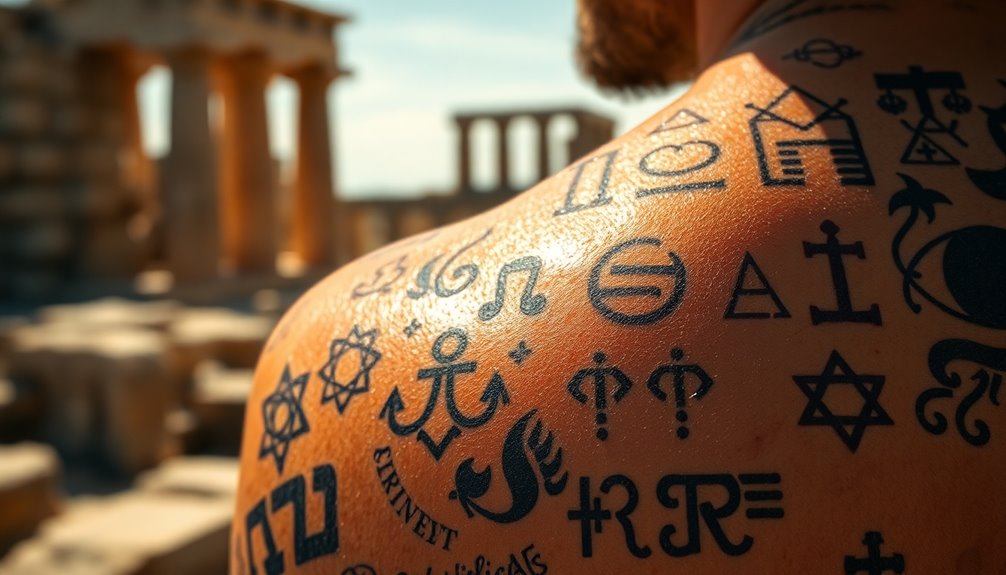The Bible offers a complex view on tattoos, especially in the context of Revelations. While Leviticus 19:28 prohibits tattoos for the Israelites, this stems from Old Testament laws linked to pagan practices. Revelations 19:16 mentions Jesus having a name on His thigh, which many see as symbolic rather than a literal endorsement of tattoos. It's important to consider personal convictions and cultural contexts regarding body art, as the New Testament doesn't provide clear directives on tattoos. Understanding these nuances can help shape your perspective on tattoos today, and there's more to explore about their significance in faith and identity.
Key Takeaways
- Revelation 19:16 depicts Jesus with a name on His thigh, symbolizing identity rather than endorsing tattoos as a practice.
- The New Testament does not explicitly address tattoos, allowing for personal interpretation and conviction among Christians.
- Tattoos can represent personal beliefs and experiences, reflecting one's faith journey in a contemporary context.
- The cultural significance of tattoos has evolved, and their interpretation varies widely among different Christian communities.
- Engaging in dialogue about tattoos helps individuals understand their spiritual implications and reconcile personal choices with their faith.
Introduction

When you think about tattoos, you might picture vibrant ink etched onto skin, but the Bible's perspective on body art is a topic of debate among believers. The book of Revelation doesn't explicitly mention tattoos; instead, it presents symbolic imagery and profound visions, particularly regarding Jesus. In Revelation 19:16, you find Jesus depicted with a name written on His robe and thigh. This is often interpreted as a symbolic representation of His authority rather than a literal tattoo, highlighting the significance of titles over body art.
It's important to recognize that Leviticus 19:28, which prohibits tattoos, is part of the Old Testament laws given to the Israelites and isn't directly addressed in the New Testament.
While individual Christians may draw different conclusions about tattoos, the New Testament encourages you to reflect on your personal convictions and the motivations behind getting inked. The cultural context of ancient practices suggests that the imagery in Revelation is figurative, urging you to consider the deeper meanings rather than viewing body art through a rigid lens.
Ultimately, the discussion around tattoos in the Bible invites thoughtful consideration rather than definitive answers.
Biblical Insights on Tattoos

When you explore biblical insights on tattoos, you'll find varying references that can shape your understanding.
Leviticus 19:28 explicitly prohibits tattoos for the Israelites, while the New Testament leaves the topic largely open to interpretation.
As you consider these passages, think about how they align with your beliefs and cultural context.
Primary Bible References
Tattoos often spark debate among Christians, particularly when looking at biblical references. One of the most cited verses is Leviticus 19:28, which prohibits tattoos for the Israelites, linking them to pagan practices.
However, it's important to remember that this command is part of the Old Testament Law and isn't directly addressed in the New Testament.
Interestingly, while the Book of Revelation doesn't explicitly mention tattoos, it presents symbolic imagery, focusing instead on Christ's authority with the title "King of Kings and Lord of Lords" in Revelation 19:16.
The name inscribed on Jesus' thigh is often seen as symbolic, reflecting ancient customs of displaying royal titles rather than representing a literal tattoo.
Contemporary Christian views on tattoos vary widely. Many see them as a form of cultural expression or personal faith representation, especially since the New Testament lacks a clear directive against them.
You might find popular verses like Philippians 4:13 inked as tattoos, showcasing personal beliefs and experiences, despite the absence of explicit biblical endorsement for tattoos.
Ultimately, your interpretation and conviction play key roles in this ongoing discussion.
Secondary Bible References
Examining secondary biblical references can provide deeper insights into the topic of tattoos in a Christian context. While the Book of Revelation doesn't directly mention tattoos, Leviticus 19:28 does prohibit them for the Israelites. This prohibition is tied to cultural practices linked with paganism and idolatry, suggesting that the concern was more about the heart's intent than the act itself.
In Revelation 19:16, Jesus is described with a name on his robe and thigh; however, this is typically interpreted symbolically rather than as a literal tattoo. It reflects the historical context where titles were often woven into garments, thus enhancing the symbolic imagery throughout Revelation.
Contemporary Christian views on tattoos vary widely. Some see them as cultural expressions, embracing art and individuality, while others adhere strictly to the traditional prohibition from Leviticus.
Ultimately, the conversation about tattoos in a Christian context invites reflection on intent, meaning, and cultural significance. You're encouraged to consider how these perspectives align with your beliefs and values as you navigate this complex topic.
Ancient Tattooing Practices in Israel

In ancient Israel, the cultural landscape was deeply intertwined with religious beliefs and practices, which influenced attitudes toward body modifications like tattoos.
The Mosaic Law, particularly in Leviticus 19:28, explicitly prohibited tattoos, linking them to pagan mourning rituals and idolatry. This prohibition was more than a mere suggestion; it was a command that governed various aspects of daily life for the Israelites.
The Hebrew term used for "tattoo" in Leviticus denotes a permanent marking, highlighting the cultural rejection of body modifications associated with foreign rituals.
Historical context reveals that body markings were often tied to mourning and the worship of deities outside the Israelite faith, practices that the Israelites were called to avoid.
Jewish customs emphasized the sanctity of the body as a creation of God, fostering a strong aversion to alterations like tattooing.
Cultural Context of Tattooing

The cultural landscape of ancient Israel shaped the views on tattoos and body modifications significantly. In this context, tattoos were often linked to pagan rituals and mourning practices, which led to their prohibition in Leviticus 19:28. This part of the Mosaic Law aimed to distinguish the Israelites from surrounding cultures that engaged in body marking as a form of idolatry. Observant Jews, including Jesus, adhered to this prohibition, emphasizing purity and strict compliance with the Law.
Instead of tattoos, historical practices among nobility focused on displaying titles on garments, which aligned more closely with societal norms surrounding authority and identity. Such practices reinforced the cultural values of the time, where body art wasn't just a personal choice but a reflection of one's standing in the community.
While the Book of Revelation doesn't directly address tattoos, understanding the cultural implications surrounding body art in ancient Israel is vital. Recognizing how these customs influenced perceptions of identity and spirituality provides deeper insight into the significance of tattoos in biblical narratives and contemporary discussions.
This context helps you appreciate how tattoos were viewed within the framework of ancient customs and societal values.
Tattoos as Cultural Expressions

Tattoos aren't just ink on skin; they often reflect deep cultural significance and identity.
You might find that many misconceptions about tattoos stem from historical contexts that don't apply today.
Understanding their cultural relevance can help you appreciate the diverse meanings behind this form of expression.
Debunk Common Misconceptions
Often, people assume that tattoos are strictly forbidden by biblical teachings, but this belief overlooks important context. The Book of Revelation doesn't specifically mention tattoos, allowing for a broader interpretation of body art within Christianity. Many Christians see tattoos as a legitimate form of artistic expression that can reflect their faith or personal experiences, without contradicting biblical principles.
The prohibition found in Leviticus 19:28 originates from cultural practices tied to pagan mourning rituals, rather than an outright condemnation of body art. This historical context is crucial; it shows that tattoos weren't universally viewed as sinful.
Instead, contemporary discussions among Christians focus on personal conviction and the intention behind the tattoo. When considering tattoos, it's essential to recognize that cultural expressions are often influenced by individual beliefs and historical significance.
Therefore, rather than viewing tattoos as a blanket taboo, you should examine the motivations behind them. A tattoo can signify personal journeys, commitments, or faith, enriching a believer's spiritual narrative. Ultimately, it's about understanding the deeper meaning and intent rather than adhering to misconceptions.
Cultural Relevance of Tattoos
While many people view tattoos as mere body art, they actually serve as powerful cultural expressions that reflect your personal beliefs and experiences. Each tattoo can carry significant meaning, transcending decoration to convey messages of identity, status, or achievement. Historically, in various cultures, tattoos have marked tribal affiliations or milestones, showcasing a rich tapestry of human expression.
In today's world, the acceptance of tattoos has grown, leading to a diverse range of designs that often include religious themes or symbols. This fusion fosters dialogue about faith and art, allowing you to explore and express your beliefs visually.
Tattoos can also challenge traditional norms, prompting conversations about individuality versus conformity within different communities.
The rise of Christian-themed tattoos exemplifies this intersection of faith and personal expression. You may find that these tattoos help navigate your beliefs in a contemporary context, creating a unique blend of spirituality and artistry.
Ultimately, tattoos can be more than just ink on skin; they represent a canvas for storytelling, inviting you to share your journey and connect with others on a deeper level.
Tattoos in Personal Identity

Tattoos can hold deep personal meaning, often reflecting your beliefs and experiences.
As you consider faith-based tattoo discussions, think about how these designs might symbolize your journey with God.
Each tattoo can become a unique expression of your identity, merging personal significance with spiritual expression.
Personal Meaning Behind Tattoos
In many ways, tattoos become powerful symbols of personal identity, encapsulating beliefs, experiences, and values that resonate deeply with your faith journey. They can reflect your individual beliefs and experiences, showcasing what matters most to you. For many, choosing a tattoo with a biblical verse, like Philippians 4:13, symbolizes personal strength and faith, illustrating how scripture can shape your identity.
However, the conversation around tattoos in a Christian context is diverse. Some see them as a form of honoring God, while others strictly adhere to traditional teachings against body markings. This divergence highlights the importance of thoughtful reflection on your motivations behind getting a tattoo.
Remember, the permanence of tattoos means they can significantly impact how you view yourself over time.
While Leviticus contains prohibitions on tattoos, the New Testament doesn't offer specific directives, allowing you the freedom to interpret your faith practices in a way that aligns with your personal journey.
Ultimately, your tattoos can be a meaningful expression of who you're and what you believe, serving as a testament to your unique spiritual path.
Faith-Based Tattoo Discussions
Frequently, faith-based tattoo discussions delve into how these body art forms can serve as profound expressions of personal identity. While the Book of Revelation doesn't explicitly mention tattoos, its rich symbolism invites interpretation. For instance, Revelation 19:16 describes Jesus as "King of Kings and Lord of Lords," representing a royal title rather than a literal tattoo. This aligns with ancient customs where titles adorned garments, not necessarily modern tattoo practices.
You might also consider the historical context of Leviticus 19:28, which prohibits tattoos for the Israelites. However, the New Testament doesn't provide a clear stance on tattoos for Christians. This opens the door for personal conviction and cultural interpretation.
In contemporary Christianity, tattoos often emerge as meaningful expressions of faith or personal identity. It's essential to reflect on your motivations behind getting a tattoo. Are you honoring a belief, commemorating an experience, or expressing individuality?
Engaging in thoughtful dialogue about tattoos can help you navigate your personal journey and understand their significance in your spiritual life. Ultimately, your body art can become a testimony of your faith and identity.
Final Thoughts on Tattoos

While the Bible's specific stance on tattoos may not be clear-cut, considering their cultural and personal significance can lead to a deeper understanding. The primary biblical reference, Leviticus 19:28, reflects ancient customs rather than providing a universal prohibition for today. In the New Testament, tattoos aren't directly addressed, leaving room for varied interpretations among Christians.
When you think about getting a tattoo, it's essential to reflect on your motivations. Many view tattoos as personal expressions of faith or identity, suggesting that the intention behind the tattoo matters significantly. Are you honoring your beliefs, or is it merely a trend? This self-reflection is crucial as it helps you determine the spiritual implications of your choice.
Additionally, consider the potential social implications. Tattoos can evoke different reactions in various communities, and understanding this dynamic can guide your decision.
Ultimately, whether you choose to get a tattoo or not, ensure it aligns with your beliefs and honors your faith. This thoughtful approach can lead to a more meaningful decision that resonates with your personal journey.
Additional Resources

Exploring the topic of tattoos can lead you to a variety of resources that provide deeper insights into biblical perspectives and contemporary views.
Start with the Book of Leviticus, specifically Leviticus 19:28, which is often cited in discussions about tattoos. This verse highlights the cultural context of ancient Israelite customs and can help you understand the historical background.
Next, dive into the Book of Revelation, particularly Revelation 19:16, where Jesus is described as having the title "King of Kings and Lord of Lords" on His robe and thigh. This passage offers a symbolic perspective rather than an endorsement of tattoos, emphasizing the importance of identity over permanent markings.
You might also explore contemporary Christian literature that discusses tattoos, as opinions vary widely within the faith. Some authors argue for personal interpretation and conviction, while others maintain traditional views against body markings.
Additionally, consider engaging in discussions with your church community or seeking guidance from spiritual leaders who can provide personal insights.
These resources can help you navigate your own beliefs and convictions regarding tattoos in light of biblical teachings.
Frequently Asked Questions
Does Revelation Talk About Tattoos?
Revelation doesn't specifically mention tattoos. The book focuses more on symbolic imagery and prophetic visions rather than individual practices like body art.
While some interpret the imagery of Jesus having a name on His robe and thigh as symbolic, it's not a direct reference to tattoos.
Since there's no clear prohibition in the New Testament on tattoos, you can consider your personal beliefs and intentions regarding body art without feeling bound by ancient laws.
What Does Revelation 19 Verse 16 Mean?
Revelation 19:16 depicts Jesus as a powerful figure, emphasizing His authority as "King of Kings and Lord of Lords."
You'll notice that the title is written on His robe and thigh, symbolizing His triumph rather than suggesting a literal tattoo.
This imagery highlights His divine identity and role during the apocalyptic events, using vivid language typical of the genre to convey deeper spiritual truths rather than physical markings.
Are Tattoos Forbidden in the Bible?
Tattoos aren't explicitly forbidden in the Bible.
While Leviticus 19:28 prohibits them for the Israelites, many believe this was tied to specific cultural practices rather than a general rule against body art.
In the New Testament, there's no direct mention of tattoos, suggesting you have the freedom to decide for yourself.
If you're considering a tattoo, think about your personal beliefs and the potential impact on your life and relationships.
What Does the Bible Say About Tattoos in the New King James Version?
The New King James Version doesn't specifically address tattoos.
While Leviticus 19:28 prohibits them, this directive isn't reiterated in the New Testament.
You'll find that many contemporary Christians have differing views on tattoos, seeing them as personal or cultural expressions.
Ultimately, the absence of a clear stance in the NKJV suggests that you can decide for yourself, considering both your beliefs and the cultural context surrounding tattoos today.










